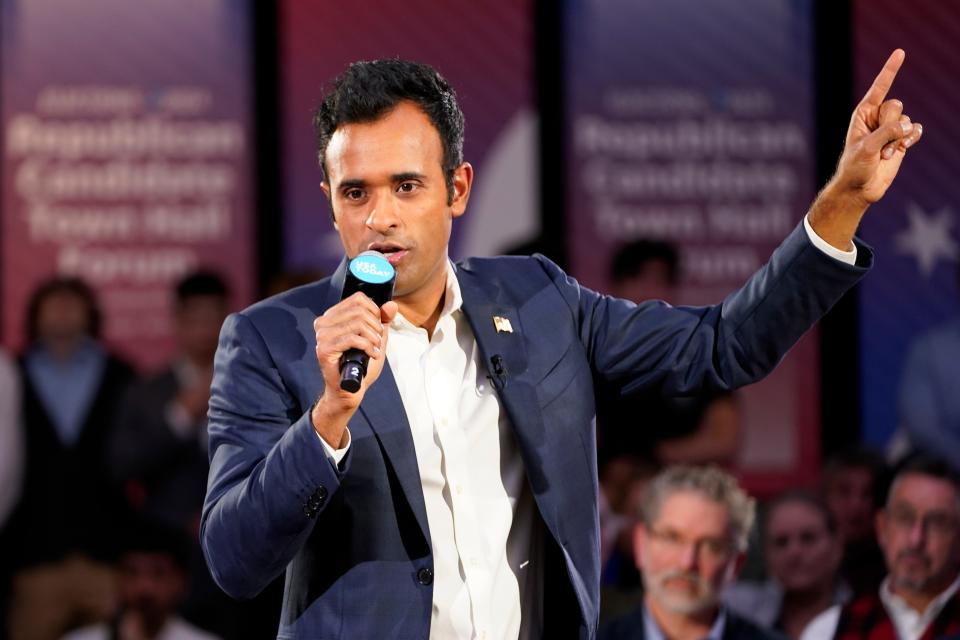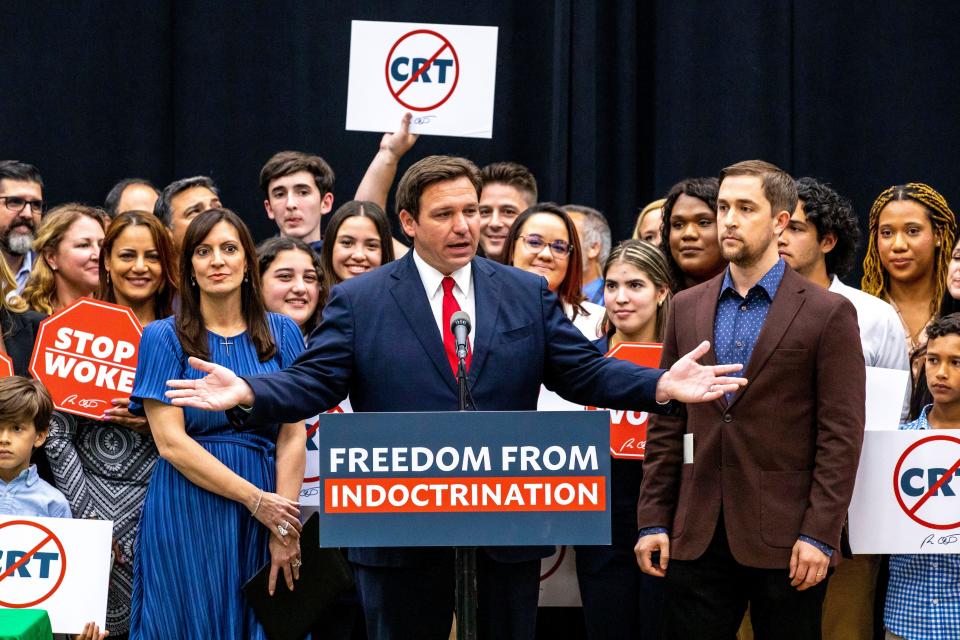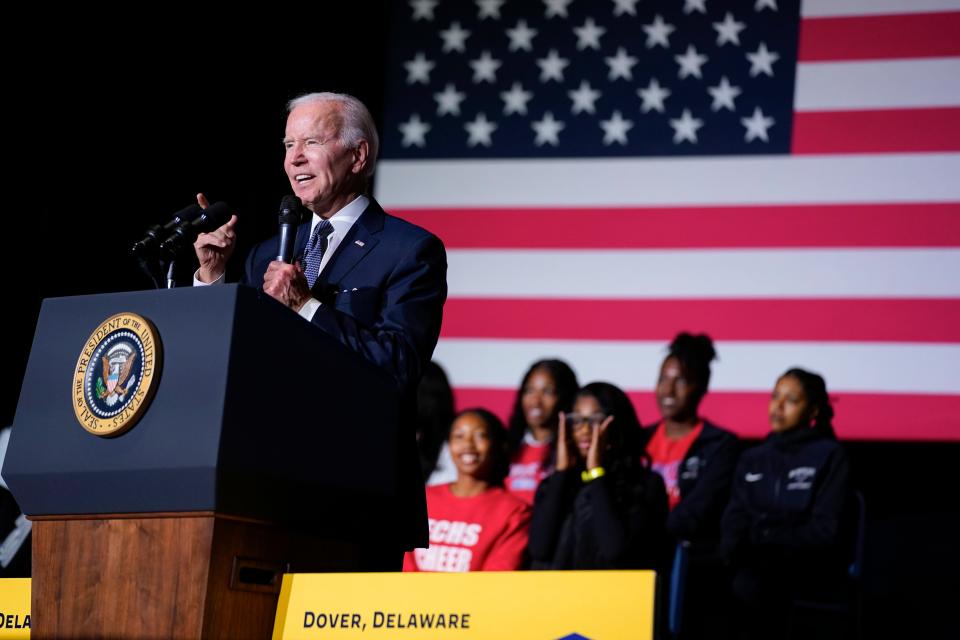'Quantum-leap change': How school choice, book bans and student loans are taking center stage in 2024
- Oops!Something went wrong.Please try again later.
- Oops!Something went wrong.Please try again later.
As schools grapple with learning loss in the wake of the COVID-19 pandemic and communities see “culture war” curriculum debates flare, education has become a major talking point on the 2024 campaign trail.
Several Republican White House hopefuls have proposed their ideas for reforms, from ongoing GOP efforts to grow school choice programs to larger scale plans to eradicate the Department of Education.
Education, an issue that hasn't had “a lot of daylight” between Republicans and Democrats in modern politics, has become especially partisan within the last decade, said Jennifer Steele, a professor in American University’s School of Education.
“I've been around this field for a while, and I've never seen education as divisive as it is in this presidential election,” Steele said.
Beyond politicians’ rhetoric, the division is also felt by voters: 72% of Democrats said they believe public schools have a positive impact on the country, while nearly as many Republicans, 61%, said they see a negative impact, according to a Pew Research Center survey from last October.
Elections 2023: Abortion on the left, education on the right: Which pivotal issue will decide Virginia's fate?
The fault lines today, Steele said, fall largely around curriculum, with the epicenters being discussions of critical race theory or sexual orientation and gender identity.
“Now it's really about what is being taught, and who controls what is being taught, and whose voices are being heard,” she said. “That's where the political divide is falling.”
So what are the 2024 White House hopefuls saying about education to voters? Here's what you need to know.

'Quantum-leap change': Ramaswamy and Republicans propose an end to the Department of Education
Biotech entrepreneur and political newbie Vivek Ramaswamy has said from the outset of his campaign that, as president, he would eliminate the Department of Education.
“There are certain people – good people – in this race that will favor incremental reform of the federal government and the bureaucracy. I’m not in that camp,” Ramaswamy told voters at a USA TODAY network town hall in Exeter, New Hampshire, earlier this month.
“I favor quantum-leap change,” the Republican candidate added. “I don’t believe it is possible to incrementally reform agencies that have existed for a long time.”
Ramaswamy has proposed redistributing billions of dollars in Education Department funding to parents.
Steele called the idea “not realistic at all.”
“Once one is president, one realizes that the Department of Education is doing a lot of things that would otherwise be very hard to do," Steele said. “When they say things like this on the campaign trail, that they're going to dismantle a certain part of the cabinet, it's usually just a way to grab attention in the media cycle.”
The Department of Education's responsibilities are wide ranging, from providing financial assistance for students from low-income families to addressing discrimination complaints through their Office for Civil Rights.
Many Republicans have previously proposed closing or reducing the department, including former President Donald Trump. Former Vice President Mike Pence, Florida Gov. Ron DeSantis and North Dakota Gov. Doug Burgum have joined fellow 2024 candidate Ramaswamy in raising the idea this campaign cycle.
The pitches reflect Republican voters, who are likewise generally dissatisfied with the Department of Education. A Pew Research Center survey in March found that 65% of right-leaning respondents view the agency unfavorably.
Ramaswamy’s suggestion of returning money to parents goes hand in hand with school choice policies and programs that the GOP has long promoted. In a growing number of states, so-called school vouchers, paid for with tax dollars, cover private school tuition or pay for services like tutoring and homeschooling.
2022 midterm recap: Did Republicans take over school boards? Key education takeaways
Former South Carolina Gov. Nikki Haley has touted her record in the Palmetto State, expanding school choice and founding a nonprofit to support rural students. Another South Carolinian, Sen. Tim Scott, advertises his platform to “create choice in education,” allowing parents to choose between public, private or charter schools.
While some school choice programs in major cities, such as Washington, D.C. and New York City, have taken hold, implementing the systems in suburban and rural areas often presents “a huge logistical challenge,” Steele said.
“In most parts of the country, it's not feasible for parents to suddenly start playing musical chairs with schools,” she said.

Banking on parents' concerns and campaigning on parents' rights
A rallying cry for Republicans in the 2022 midterm elections, “parental rights” in schools continue to be a prominent message ahead of next year’s presidential race. In the still-crowded Republican field, DeSantis has one of the most high-profile track records in this area.
His Parental Rights in Education bill − dubbed by critics the “Don’t Say Gay” law − was passed in 2022 and expanded this year to bar instruction on gender identity or sexuality in K-12 classes. It also bans teachers from using students' pronouns that do not match their sex assigned at birth.
Other 2024 candidates have touted parents’ authority to control the education their children receive in political ads and campaign events, including Haley.
During a town hall hosted by Moms for Liberty, a conservative organization focused on school curriculum, in Manchester, New Hampshire, last month, Haley said, “No parent should ever wonder what’s being said or taught to their child in the classroom.”
“We need full transparency in the classroom always,” she said then.
More: What's behind the national surge in book bans? A low-tech website tied to Moms for Liberty
And parents are responding to these campaign promises.
Natalie Erdossy of Fauquier County, Virginia, said education led the once-Democrat to vote for her first Republican, Gov. Glenn Youngkin, in the 2021 Virginia gubernatorial race.
“Once the focus turned to education, it's just going to stay there because there's no looking away once you see what's going on,” Erdossy said while at a rally earlier this month hosted by Youngkin and sporting a Moms for Liberty T-shirt.
Critics, though, have accused the parents' rights movement of being a guise for racist or homophobic beliefs, designed to limit which perspectives or versions of history are taught in classrooms. The Southern Poverty Law Center has listed Moms for Liberty as an extremist group over accusations of harassing community members, advancing misinformation about LGBTQ+ people and fighting to remove materials about diversity from classrooms.
Messages from Youngkin, DeSantis and other GOP leaders who have made parents' rights a cornerstone of their education agenda are oftentimes, Steele said, scare tactics.
“What we need to tell parents is that they should feel safe in trusting their children to learn about a complex set of academic topics,” she said.

Education in a second Biden administration
America's political parties are not only more divided on education, Steele said, but they're also often having distinct conversations about the issue.
On the other side of the aisle, President Joe Biden, the expected 2024 Democratic nominee, hasn't focused on the territory Republicans have targeted. One of his administration's signature pushes has been for student loan forgiveness.
Biden's latest attempt: Who are the winners and losers in the president's SAVE student loan repayment plan based on income?
Biden's attempts to forgive the debts of hundreds of thousands of borrowers has faced years of legal hurdles. That includes a recent lawsuit by the Cato Institute and Mackinac Center for Public Policy, arguing that the federal government does not have the authority to carry out their plans.
Nevertheless, the president has directly addressed some Republican efforts. In his speech at the White House Pride celebration in June, Biden took a moment to criticize what he called "hateful bills like Don't Say Gay," without explicitly mentioning DeSantis.
He also at the time denounced book bans in school libraries, another growing movement from politicians and groups on the right.
"(School book bans) may violate the federal civil rights laws when they target LGBTQ students or students of color and create hostile classroom environments," Biden said.
Jill Biden, a longtime educator who has made the classroom a central focus of her tenure as first lady, reflected on book bans during a speech earlier this month, referencing "the bisexual student who wants to see herself reflected in the books she can borrow from her school library."
"In America, we don’t ban books," she said.
This article originally appeared on USA TODAY: School choice, student loans: 2024 Republicans on classroom debates

